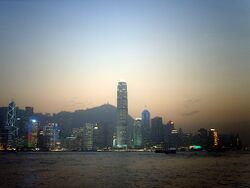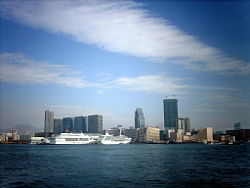Hong Kong: Difference between revisions
imported>John Stephenson (99 lease, rather than 100, oddly) |
imported>John Stephenson (language section) |
||
| Line 4: | Line 4: | ||
[[Image:Hong Kong harbour form Hong Kong Central.JPG|left|thumb|250px|{{#ifexist:Template:Hong Kong harbour form Hong Kong Central.JPG/credit|{{Hong Kong harbour form Hong Kong Central.JPG/credit}}<br/>|}}Hong Kong is an important stop for most cruises in the East. Several cruise ships lie docked at Hong Kong's Harbour City, a large shopping mall on the Kowloon, mainland, side of Hong Kong harbour.]] | [[Image:Hong Kong harbour form Hong Kong Central.JPG|left|thumb|250px|{{#ifexist:Template:Hong Kong harbour form Hong Kong Central.JPG/credit|{{Hong Kong harbour form Hong Kong Central.JPG/credit}}<br/>|}}Hong Kong is an important stop for most cruises in the East. Several cruise ships lie docked at Hong Kong's Harbour City, a large shopping mall on the Kowloon, mainland, side of Hong Kong harbour.]] | ||
The island of Hong Kong was taken from the Chinese, initially by the Dutch, and then by the British, during the 18th Century. The opium wars between Britain and China resulted in Britain obtaining a lease to expand Hong Kong, deeper into the [[New Territories]] of the Kowloon Peninsula. In 1997, at the end of the 99 year lease, the whole of the Hong Kong territory was returned to China. The Chinese instituted a system of "One Country, Two Systems." This created China's first Special Administration Region in Hong Kong. As a result, Hong Kong is highly autonomous with its own government and laws, distinct from that of the rest of the | The island of Hong Kong was taken from the Chinese, initially by the Dutch, and then by the British, during the 18th Century. The opium wars between Britain and China resulted in Britain obtaining a lease to expand Hong Kong, deeper into the [[New Territories]] of the Kowloon Peninsula. In 1997, at the end of the 99 year lease, the whole of the Hong Kong territory was returned to China. The Chinese instituted a system of "One Country, Two Systems." This created China's first Special Administration Region in Hong Kong. As a result, Hong Kong is highly autonomous with its own government and laws, distinct from that of the rest of the People's Republic. Hong Kong maintains its own Immigration and Custom controls and travel between the SAR and the mainland requires similar documentation, checks and procedures as travelling to a foreign country. | ||
==Name== | ==Name== | ||
Hong Kong literally means "fragrant harbor", and is written in Chinese as 香港. | Hong Kong literally means "fragrant harbor", and is written in Chinese as 香港. | ||
==Language== | |||
The main language of Hong Kong is [[Cantonese language|Cantonese]], one of the many varieties of Chinese. It is related to but not mutually intelligible with [[Mandarin language|Mandarin]]. Although a dialect of Mandarin forms 'standard Chinese', Cantonese has its own standard dialect, with a written form using [[Chinese characters]]. This is quite different from written Mandarin. [[English language|English]] is also widely spoken, due to the region's prior status as a colony of the United Kingdom. Signs in Chinese and English are commonplace. Cantonese includes vocabulary derived from English, due to extensive contact between the two languages. | |||
<!-- # History - When and why was the town founded. Detail major steps in the growth of the town. | <!-- # History - When and why was the town founded. Detail major steps in the growth of the town. | ||
Revision as of 04:27, 22 April 2008
What most people erroneously consider to be the city of Hong Kong is actually only a part of the Hong Kong Special Administration Region, which is located in the south of the People's Republic of China in the Pearl River delta area of the South China Sea. The SAR consists of a number of islands and of the mainland Kowloon peninsula. Hong Kong has a single land border on its north with Guandong Province. It is only a short distance by sea to Macau, China's only other Special Administration Region.
The island of Hong Kong was taken from the Chinese, initially by the Dutch, and then by the British, during the 18th Century. The opium wars between Britain and China resulted in Britain obtaining a lease to expand Hong Kong, deeper into the New Territories of the Kowloon Peninsula. In 1997, at the end of the 99 year lease, the whole of the Hong Kong territory was returned to China. The Chinese instituted a system of "One Country, Two Systems." This created China's first Special Administration Region in Hong Kong. As a result, Hong Kong is highly autonomous with its own government and laws, distinct from that of the rest of the People's Republic. Hong Kong maintains its own Immigration and Custom controls and travel between the SAR and the mainland requires similar documentation, checks and procedures as travelling to a foreign country.
Name
Hong Kong literally means "fragrant harbor", and is written in Chinese as 香港.
Language
The main language of Hong Kong is Cantonese, one of the many varieties of Chinese. It is related to but not mutually intelligible with Mandarin. Although a dialect of Mandarin forms 'standard Chinese', Cantonese has its own standard dialect, with a written form using Chinese characters. This is quite different from written Mandarin. English is also widely spoken, due to the region's prior status as a colony of the United Kingdom. Signs in Chinese and English are commonplace. Cantonese includes vocabulary derived from English, due to extensive contact between the two languages.

